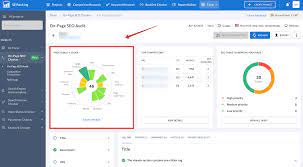Website SEO audit: our comparison of the different tools

If we had to compare the SEO audit to a daily action, it would perhaps be the annual health check carried out at the doctor’s office! If the analogy seems strong, it is however not far from the truth. The SEO audit is used to analyze the failures on its website and to find how to improve its referencing. In summary, check the health of your site and make sure it can once again reach pole position in the search results.
Just as a doctor uses medical equipment to examine you (stethoscope, thermometer, blood pressure monitor, etc.), the SEO audit relies on a whole arsenal of powerful tools to analyze your website. Here is our comparison of the 15 best tools on the market with their advantages and disadvantages… without forgetting their price at the end of this article!
Website audit: The classic – but very effective – Google tools
Since a priori, you will seek to be well referenced on Google, why not start by studying the SEO tools of the Californian giant.
1.Google Analytics
Google Analytics is a powerful analytics tool that tracks all of your business data using a unique tracking code installed on every page of your site. Indispensable to all SaaS software SEOs, it helps you measure, among other things, traffic and conversions.
Why use Google Analytics for your SEO auditing service?
Simply because it’s a Google tool that analyzes your hosted site… on Google! It allows you to follow the pages generating traffic, to analyze your key KPIs (for example, the bounce rate) or to identify the pages which generate the most conversions.
The + of the tool:
- A free version already very effective
- An easy-to-configure tool
- Default analytics reports for your site: Audience, Acquisition, Behavior and Conversion
- Management of several sites on the same user account
- Advanced features like Event Tracking or Enhanced E-Commerce
- Regular updates
- The indication on the traffic of your site: direct traffic, organic traffic and paid traffic
The – of the tool:
- A lot (too much?) of information to decipher
- The existence of data sampling reducing the reliability of reports
- The limited number of visits per month (on the free version)
- Lack of GDPR compliance
- Customer support present only on the Premium version
- A lack of data on organic keywords
2.Google Search Console ❤️
The console helps you track the indexing status of your site on Google, analyze your performance in search results, as well as detect and correct potential errors. The large volume of data collected allows you to improve your pages, to obtain more backlinks… in short, to better optimize the referencing of your site.
Why use Google Search Console for your SEO audit?
Going back to our analogy from the beginning, the GSC gives you the medical record of your data and tells you where efforts need to be made and errors corrected. If you had to choose only one tool among all the others, it would be this one!
The + of the tool:
- Free
- Email alerts when an error is detected
- Monthly search volume of queries
- The queries your pages are ranking on
The – of the tool:
- A difficult tool for beginners
- A time-consuming tool that requires regular analysis
Website audit: SEO audit specialists
SEO is so important to sites that many publishers have embarked on creating all-in-one SEO tools.
3.Ahrefs
Created in 2011, Ahrefs has become a go-to tool for marketers around the world. It provides a wealth of data and information for:
- Audit your site for technical SEO issues that may affect its performance;
- Improve your search engine optimization efforts.
Why use Ahrefs for your SEO audit?
With features like keyword research, backlink and competitor analysis, Ahrefs offers a powerful suite of tools to help you understand your website’s performance and identify areas for improvement. You can also use its Keyword Explorer tool to find relevant, high-traffic keywords to target in your content.
The + of the tool:
- The Keyword Explorer which provides a list of keywords with a certain amount of information (volume, difficulty, traffic potential, question, etc.)
- Keyword alerts sent to your email address
- Relatively easy user experience, even for beginners
- Largest backlink base
The – of the tool:
- Lack of integration with Google Analytics or GSC
- Suggested keywords that are irrelevant to your search
- A first subscription a little expensive in view of its limits
Used daily by the WebConversion teams!
4.Semrush
If its functionalities are similar to those of its direct competitor Ahrefs, Semrush is a multi-tasking tool that stands out on the analysis of keywords. In addition to its hundreds of features, it is also interesting for measuring the effectiveness of advertising campaigns.
Why use Semrush for your SEO audit?
Semrush offers a full suite of SEO tools (keyword, competition, and content and backlink analysis). Here again, the tool is really relevant to know the state of the pages (before focusing on the state of the content) and to determine where the shoe pinches (loading speed, format error, poorly optimized content, etc.).
The + of the tool:
- Clear indications in the event of a problem
- Keywords by intent (informational, navigational, commercial and transactional)
- The Content Marketing feature to implement a relevant content strategy
The – of the tool:
- The higher entry price than other tools
- The Traffic Analytics tool only offers estimates
5.Moz
Created in 2004, this SEO tool is still resisting! It holds the largest link index in the industry and developed standard metrics that are still used today. If it has long been sought in the face of the massive arrival of all-in-one SEO audit tools, it has succeeded in adapting to market needs.
Why use Moz for your SEO audit?
It offers a full suite of SEO tools for small businesses, in particular, who want to manage their organic search within a single interface.
The + of the tool:
- The priority score that quantifies the importance of the keyword for your business
- The site crawler, very effective for daily checks
- Free tools to get you started
The – of the tool:
- Proposed keyword searches that lack relevance
- A fairly high first subscription
6.SEranking
SEranking is a serious competitor to Ahrefs. A little more recent than its congeners, it is particularly used by marketers in the SaaS sector and by digital marketing agencies.
Why use SEranking for your SEO audit?
It allows you to find your potential competitors through a simple search query and explore their paid advertisements, in addition to its multiple features (social media management, backlinks, ranking of important keywords, etc.).
The + of the tool:
- The ability to check the PPC (pay per click) keywords of your competitors
- Full site audit
- The white label option
- Keyword Rank Tracking
- Two weeks free trial
The – of the tool:
- A somewhat complex tool for beginners
7.Ranxplorer
This SEO audit tool is exclusively French and is based on the French market only. It has a more robust and precise database than the other tools… but essentially French.
Why use Ranxplorer for your SEO audit?
The tool is based on a beautiful database with nearly 3 billion results, 100 million keywords and 30 million sites. Here you can analyze natural, paid and universal search results.
The + of the tool:
- Its ease of use
- Its particularly competitive cost
- Being able to spot keywords on images
- Very easy to use interface
The – of the tool:
- The absence of a technical audit
- The impossibility for multilingual sites to analyze their entire site
- The frequency of data updates, limited to once a month
Used daily by the WebConversion teams!
SEO audit: keyword research tools
While the majority of the tools presented above already have keyword research functionalities, some marketers will choose to supplement them with more specialized tools.
8.AnswerThePublic
AnswerThePublic is an online tool that allows you to generate content ideas based on questions asked by Internet users on a given subject. Thanks to its wheel-shaped visualization functionality, the tool facilitates understanding of the most relevant themes and topics, related to a specific query.
In addition to providing content ideas, AnswerThePublic can identify key phrases associated with a query, which can help you optimize the natural referencing of your website.
Why use AnswerThePublic for your SEO audit?
It’s especially useful for content marketers, copywriters, bloggers, and SEO professionals looking to better understand online user concerns and questions, as well as build comprehensive topic groups that cater to everyone. The different types of requests.
The + of the tool:
- Its free version, although limiting in your daily searches
- Its ease of use
- Visualization of online user queries
The – of the tool:
- Its very high price
9.Ubersuggest
Ubersuggest is an online tool that helps analyze and optimize a website’s online presence, providing information on relevant keywords, their competition and trend.
Why use Ubersuggest for your SEO audit?
The tool is useful for marketers and writers looking for content suggestions and related keywords.
The + of the tool:
- It’s very reasonable entry price
- Sa free version, well that limiting
- Reports of accidents on your site and advice on how to fix them
The – of the tool:
- No negative point, particularly prohibitive, has been raised!
Website audit: the secret weapons of content writing
At WebConversion, we are surrounded by Content Managers who are particularly formidable in the art of handling words… and keywords. But if you don’t have the chance to work with us (to fix it, its ↪️ here!), here are some SEO automation tools that will give you guidelines for including keywords in your content.
10.Clearscope
This semantic analysis tool optimizes the content of a website based on keyword analysis and semantic relevance data. It analyzes a given text and provides specific recommendations to improve it, based on the relevant keywords and terms associated with a subject.
Why use Clearscope for your SEO audit?
By using Clearscope, copywriters and marketers can create highly relevant, search engine optimized content that meets user expectations. It is effective for companies looking to improve their natural referencing and optimize their content to meet user expectations. You just have to enter your document in the tool, which then takes care of guiding you in its referencing.
The + of the tool:
- It guides the user in the creation of content with high added value in terms of SEO services
The – of the tool:
- It’s very high price
11.SurferSEO
If you want to ride the SEO wave, then SurferSEO might be of interest to you! It has much the same functionality as the Clearscope tool but has a bit more in-depth search results analysis function.
Why use SurferSEO for your SEO audit?
SurferSEO uses artificial intelligence to analyze the competition, identify important ranking factors and provide precise recommendations to optimize the content of a website. Also, it helps you research keywords and audit your competitors’ pages.
The + of the tool:
- The use of AI
- Semantic content optimization
The – of the tool:
- A somewhat complex interface for beginners
SEO audit: website crawling and auditing tools
Like an Indiana Jones in search of the lost (SEO) temple, you can use the following tools to explore every corner of your website and carry out meticulous SEO audits.
12.ScreamingFrog
Unlike the other tools on the list, ScreamingFrog is not hosted on the Cloud but must be downloaded to your computer: it is a crawler. Just enter your website URL and the tool crawls the pages for potential errors.
Why use ScreamingFrog for your SEO audit?
With Screaming Frog, you can perform in -depth SEO analysis, including broken link checking, site architecture exploration, Meta information analysis and much more.
The + of the tool:
- The free version, but limited to 500 URLs
- An easy-to-use tool
- The information provided on the backlinks and the referencing of the pages
The – of the tool:
- A license to buy and renew every year
- A somewhat outdated interface
- A difficult tool for beginners
- A tool less well suited to very large sites
13.Sitebulb
It is also a site exploration software, very complete for SEO audits.
Why use Sitebulb for your SEO audit?
Sitebulb provides the big picture through site scores and SEO scores, and lets you view your website like Google does, through HTML crawling and JavaScript rendering. Unlike Screamingfrog, it scans all website sizes without slowness.
The + of the tool:
- The very competitive price
- It’s very easy to use
- Its panel of features around the SEO audit
The – of the tool:
- Its non-customizable reports
SEO testing and optimization tools
14.Clickflow
Clickflow helps you test your Meta descriptions as well as your title tags. It integrates with GSC and lingers on pages with high impressions but low click-through rate.
Why use Clickflow for your SEO audit?
This tool helps you track the effectiveness of the optimizations you make to pages.
The + of the tool:
- ROI data to justify the relevance of optimizing your content
- Its chatbot to assist you live
- It’s easy to use interface
The – of the tool:
- Not recommended for businesses starting out
- Its high price
15.Botify
To conclude this tour of SEO audit tools, zoom in on Botify, the most expensive tool in our comparison! Obviously, it is also one of the most powerful and is more for large companies with large websites.
Why use Botify for your SEO audit?
It is also a crawler but it offers other smart features such as Botify Analytics which provides data at each stage of the search or the Log Analyzer which allows you to view the frequency of crawls of your site by Google. You can scan your sites and learn more about the behavior of indexing robots!
The + of the tool:
- Its smart features
- The reliability of its data
The – of the tool:
- Not recommended for start-ups and small businesses with limited resources
- It’s very (too!) high price





